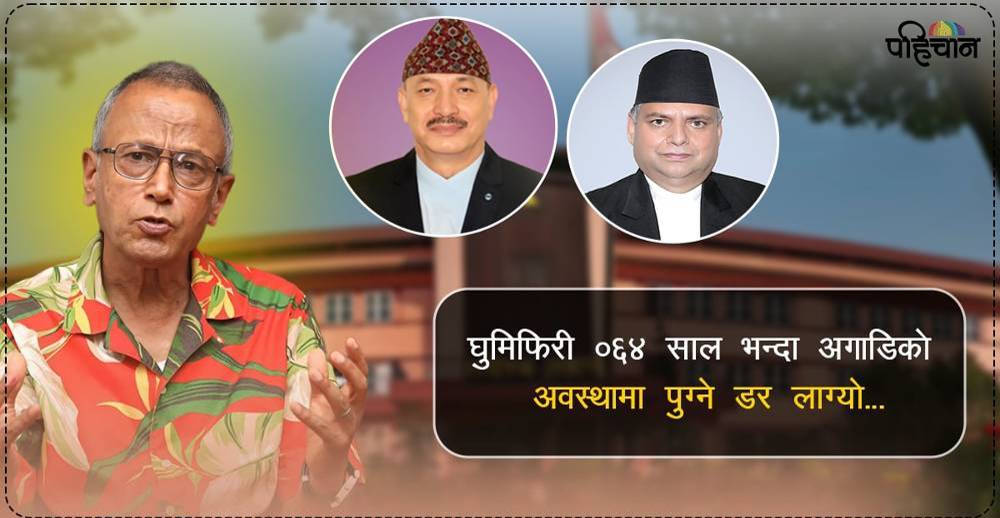
Kathmandu : The Supreme Court has released the full text of the “controversial” mandamus that allows a person to obtain government documents, including citizenship, based on their self declaration regardless of their sex at birth.
The 35-page full text dated November 6, 2023 allows individuals to receive government documents, including citizenship, if they are born as male but identify as female, or vice-versa.
Ruling on a writ petition filed by Ruksana Kapali, the apex court also issued a mandamus to update the records of Kapali, a resident of Ward No. 16 of Lalitpur Metropolitan City, who was born as male but identifies as female.
A joint bench of Chief Justice Shrestha and Justice Kumar Chudal ordered the update of the citizenship, educational certificates and other personal identity certificates to reflect Kapali’s female identity.
The court ordered that the gender details on the applicant’s citizenship certificate and other personal identity documents remain female.
The full text states, ‘It seems that some certificates mention “women”, some others mention “third gender”, and citizenship certificate mentions “other”. Although it appears that an interim order has been made to obtain documents, including her passport and voter ID card, reflecting her female identity, the gender details on some documents, including citizenship, still list “other”.”
The court recognised the inconsistency in gender identity across Kapali’s documents, and ordered the update to maintain a female description despite her being born as male. The petitioner disclosed that her Permanent Account Number and National Identity Card listed her as female. Her first passport also listed her as female, while the second mentioned “other”.
The Supreme Court previously issued an interim order to maintain a female identity on Kapali’s voter ID, which originally listed her as “third gender”. This recent order contradicts an earlier directive allowing individuals to identify as “other” gender based on self-perception.
Following a Supreme Court order in a petition filed by Sunil Babu Panta, a SGM right activist, the Ministry of Home Affairs issued guidelines on December 31, 2012, to grant citizenship to gender minority citizens under the “other” category. Kapali obtained citizenship on June 26, 2015, under these guidelines.
Kapali, despite being born biologically male, stated that she never identified as male. She argued that it is a person’s right to self-determination to obtain a gender identity based on self-perception. The Citizenship Act 2063 (Amendment) allows the SGM community to obtain citizenship and other government documents under the “other” category.
Defendants’ written replies
The Ministry of Education, Science and Technology submitted a written reply stating that it was unnecessarily named as a defendant. The Ministry argued that the writ petition lacked a clear basis or reason, and should be dismissed. The Ministry of Home Affairs, also a defendant, and the National Human Rights Commission demanded the petition’s dismissal for the same reasons.
The Ministry of Law and the Department of National ID and Civil Registration submitted written replies demanding the writ petition’s dismissal. The Ministry of Law stated, “Amendment or change in such a certificate creates discomfort and confusion even when the individual enjoys the rights granted by the Constitution and the law.”
The Office of the Prime Minister and Council of Ministers gave a written reply regarding the constitution’s provision of citizenship based on descent and gender identity in Article 12. The reply stated, “According to this constitution, a person who obtains citizenship of Nepal on the basis of descent can obtain a citizenship certificate along with gender identity in the name of their mother or father.”
The Office of the Prime Minister and Council of Ministers stated that the petitioner failed to disclose the legal basis of their claim, adding, “The matter of what kind of law to issue in the country is a matter of legislative wisdom.”
It emphasised the government’s commitment to identifying and protecting sexual and gender minorities and implementing international commitments. The government argued that since its actions have not affected anyone’s personal freedom, the petition should be dismissed.
SGM rights activists concerned about the ruling
The court’s verdict has raised a concern among the SGM community. SGM activists expressed concern about the court’s recent verdict, arguing that it impacts their constitutional rights. “This verdict pushes us to live as just a (cross) woman or a (cross) man. We do not want to live as just a woman or a man. We want our different identity,” they stated. How the government will administer and manage the same category of people into three gender identities is also a major question.
Some women also raised concerns that the decision could allow men to identify as women based on self-declaration only to qualify for reservations allocated for women, potentially disadvantageous to real women. Additionally, they questioned the implications of self-proclaimed women using women’s toilets, given that their sexual characteristics and abilities would remain male despite their documents listing them as female.
Former justice Balaram KC commented that the supreme court could have asked for further explanation from the constitutional bench on the petition that the NHRC also demanded to be dismissed. The verdict that was contrary to the court order of 2064 that allows individuals to identify as “other” gender based on self-perception, could have a serious impact on human rights, he pointed out.
“Human rights are not only the rights of one country, they are the rights of all countries,” he said. “Human rights decisions should be universally accepted.”
Copyright © All right reserved to pahichan.com Site By: Sobij.